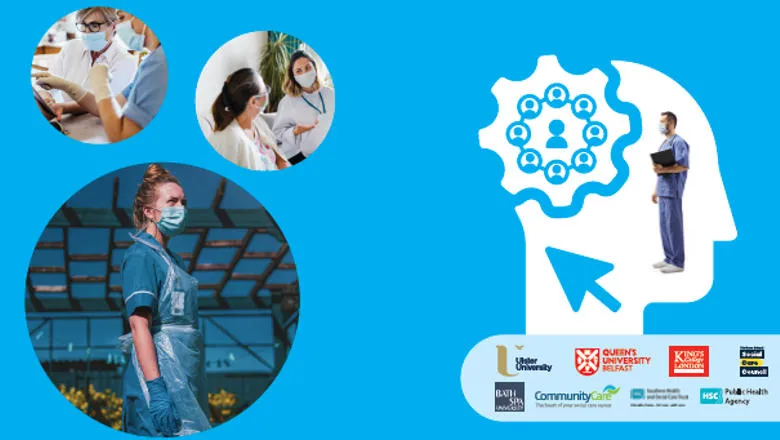03 May 2022
Health and Social Care Workforce Research Study – Phase 4
Well-being among the health and social care workforce

Jill Manthorpe, Professor of Social Work at King's and Director of the NIHR Policy Research Unit in Health and Social Care Workforce, is co-author of a new report examining the well-being of the workforce during the pandemic.
The publication reports on Phase 4 of the Health and Social Care Workforce Research Study.
A study of over 11,000 members of the Health and Social Care workforce across the UK reveals that the workforce is continuing to struggle with the changes implemented due to the COVID-19 pandemic. These changes have increased work demands resulting in increased staff burnout, stress while reducing staff morale and job satisfaction.
The collaborative research project led by Ulster University and supported by researchers from Queen’s University Belfast, Bath Spa University and King’s College London conducted surveys and focus groups with nurses, midwives, allied health professionals, social workers and social care workers about their well-being and coping strategies. Now in its fourth phase, the research collective has been charting the experience of the HSC workforce’s mental well-being, quality of working life, burnout and ways of coping at four timepoints in stages since the beginning of the COVID-19 pandemic.
During November 2021-February 2022, the HSC workforce reported working more hours overtime since the start of the pandemic with 60% reporting feeling overwhelmed by increased pressures. Despite this, nearly two-thirds of employees across the UK did not take up employer support while workers in Northern Ireland were least likely to take up employer support.
During the COVID-19 pandemic, 20% of respondents were able to work from home all the time, while 34% could work from home some of the time, compared to 36.7% prior to the pandemic. Social workers were most likely to work from home.
Principal investigator of the study Dr Patricia Gillen, Reader in Nursing and Midwifery Research and Development at Ulster University, commented:
“Despite a public perception that things in society are returning to normal, the impact of the COVID-19 pandemic is still acutely felt by the HSC workforce. We’ve been charting their experiences since May 2020 and worrying trends are developing in relation to staff burnout and a decline in mental well-being. The lack of support and recognition within this workforce is now beginning to take its toll on the already exhausted workers.
“Respondents recounted how they often felt the brunt of the service users’ frustrations with limitations in service provision, staff sickness and sustained staff shortages also adding to increased work related stress. Through this study, frontline, managerial and Human Resources (HR) staff have continued to highlight the importance of their employers demonstrating an understanding of the needs of their staff as HSC services, systems and infrastructure rebuild and respond to the changing needs of services users.
“The Good Practice recommendations detail how HSC organisations need to share best practice and work collaboratively to maximise support for staff at an individual, team, policy, professional, and organisational level.”
Take part in Phase 5 of this study!
The Phase 5 survey is now open and will run until 8 July 2022.
This publication
Gillen, P., McFadden, P., Moriarty, J., Mallett, J., Schroder, H., Ravalier, J., Manthorpe, J., Currie, D., Nicholl, P., McGrory, S., & Neill, R. (2022) Health and social care workers’ quality of working life and coping while working during the COVID-19 pandemic: Findings from a UK Survey. Phase 4: 24th November 2021 – 4th February 2022. University of Ulster Press. [Executive Summary]

